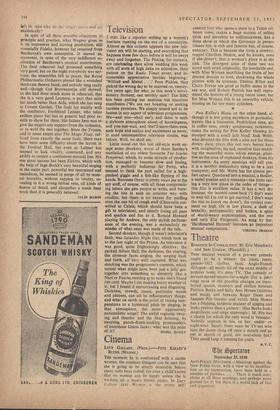Television
I FEEL like a reporter writing up a women's institute meeting on the eve of a coronation. Almost as this column appears the new tele- vision era will be starting, and everything that happens these few days before it will be swept away and forgotten. The Pickles, for instance, are celebrating their silver wedding this week with all sorts of high jinks on television, their picture on the Radio Times cover, and in- numerable appreciative burbles beginning: 'Wilfred and Mabel . . .' Poor Pickles, they picked the wrong day to be married on, twenty- five years ago; for who, in this week's televi- sionary ferment, can terribly care? The BBC has been putting out cautious but truculent manifestos ('We are not boasting or making careless promises. We simply intend not to be beaten in any aspect of television programmes. We—and you—shall see'), and there is such a slyboots atmosphere about of knowingness, and you-just-wait, and that'll-learn-them-ness, such hope and malice and excitement as never, in staid uncompetitive television circles, was before. Well, we shall see.
Little stood out this last old-style week ex- cept some shockers, worst of them Sunday's mutilation of my oldest favourite The Scarlet Pimpernel, which, by some miracle of produc- tion, managed to become slow and boring, with a perfectly ludicrous Sir Percy, who seemed to think the part called for a high- pitched giggle and a fish-like flipping of the hands. Baroness Orczy is pretty vieux jeu at the spy stuff, of course, with all those compromis- ing letters she gets people to write, and burn- ing the bits in such an amateur way with candles; but there is no excuse for muffing even the one hit of rough stuff (Chauvelin out- witted at Calais, which should have been a gift to television), and utterly losing all pace and sparkle and fun to it. Ronald Howard playing Sir Andrew, the only stylish perform- ance of the evening, was a melancholy re- minder of what once was made of the tale.
Second shocker, though it wasn't television's fault, was Saturday Night Out, which took us to the last night of the Proms. As television it was good, quite frighteningly effective : the packed Albert Hall, the darkness, the roaring, the closarup faces singing, the surging back and forth, all very well captured. What was shocking was the programme's contents, which turned what might have been just a jolly get- together into something so sinisterly like a Nazi or Fascist meeting as to make one's blood run cold. Maybe I am making heavy weather of it; but I found it embarrassing and disgusting. Darkness, crowds, music, particular words and phrases, can all be inflammatory things; and what on earth is the point of raising tem- peratures to a hysterical pitch by singing, in that atmosphere, the more aggressively nationalistic songs? The awful orgiastic sway- ing and thunder and the final hoisting, by sweating, punch-drunk-looking promenaders, of enormous Union Jacks: what was the point
































 Previous page
Previous page